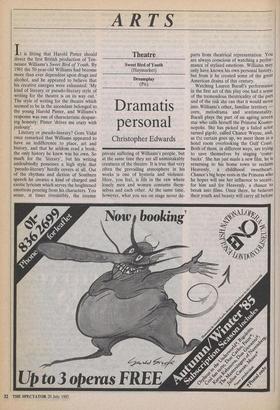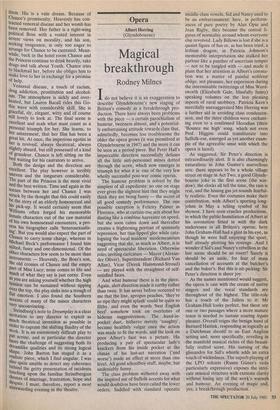ARTS
Theatre
Sweet Bird of Youth (Haymarket) Dreamplay (Pit)
Dramatis personal
Christopher Edwards
It is fitting that Harold Pinter should direct the first British production of Ten- nessee Williams's Sweet Bird of Youth. By 1961 the 50-year-old Williams had become more than ever dependent upon drugs and alcohol, and he appeared to believe that his creative energies were exhausted: 'My kind of literary or pseudo-literary style of writing for the theatre is on its way out.' The style of writing for the theatre which seemed to be in the ascendant belonged to the young Harold Pinter, and Williams's response was one of characteristic despair- ing honesty: Pinter `drives me crazy with jealousy'.
Literary or pseudo-literary? Gore Vidal once remarked that Williams appeared to have an indifference to place, art and history, and that he seldom read a book; the only history he knew was his own. So much for the literary', but his writing undoubtedly possesses a high style that 'pseudo-literary' hardly covers at all. Out of the rhythms and diction of Southern speech he creates a kind of charged and exotic lyricism which serves the heightened emotions pouring from his characters. You sense, at times irresistibly, the intense private suffering of Williams's people, but at the same time they are all unmistakably creatures of the theatre. It is true that very often the prevailing atmosphere in his works is one of hysteria and violence. Here, you feel, is life in the raw where lonely men and women consume them- selves and each other. At the same time, however, what you see on stage never de- parts from theatrical representation. You are always conscious of watching a perfor- mance of stylised emotions. Williams may only have known his own personal history, but from it he created some of the great American drama of this century. Watching Lauren Bacall's performance in the first act of this play one had a sense of the tremendous theatricality of the part and of the risk she ran that it would move into Williams's other, familiar territory corn, melodrama and sentimentality. Bacall plays the part of an ageing screen star who calls herself the Princess Kosmo- nopolis. She has picked up a failed actor turned gigolo, called Chance Wayne, and, as the curtain goes up, we meet them in a hotel room overlooking the Gulf Coast. Both of them, in different ways, are trying to save themselves by staging 'come- backs'. She has just made a new film, he is returning to his home town to reclaim Heavenly, a childhood sweetheart. Chance's big hope rests in the Princess who he hopes will use her influence to secure, for him and for Heavenly, a chance to break into films. Once there, he believes their youth and beauty will carry all before them. His is a vain dream. Because of Chance's promiscuity, Heavenly has con- tracted venereal disease and her womb has been removed. Her father is a right-wing Political Boss with a vested interest in severe views on morality, and his son, seeking vengeance, is only too eager' to arrange for Chance to be castrated. Mean- while, back in the hotel room Chance and the Princess continue to drink heavily, take drugs and talk about Youth. Chance tries to blackmail her, before she obliges him to make love to her in exchange for a promise of help.
Venereal disease, a touch of racism, drug addiction, prostitution and alcohol- ism. The atmosphere is sickly and over- heated, but Lauren Bacall rides this Go- thic wave with considerable skill. She is graceful, sly, elegant, witty and of course still lovely to look at. The final scene is excellent and seals what must count as a personal triumph for her. She learns, to her amazement, that her film has been a great hit. At once, the imperious egotist in her is revived, always theatrical, always slightly absurd, but still possessed of a kind of grandeur. Chance is left sitting on the bed waiting for his castrators to arrive. Both the design and the direction are excellent. The play however is terribly uneven and the longueurs considerable. The part of the Princess is the most vivid and the best written. Time and again in the scenes between her and Chance I was struck by the thought that this could easily be the story of an elderly homosexual and his pick-up. It would certainly seem that Williams often forged his memorable female characters out of the raw material of his own homosexual encounters, a pro- cess his biographer calls `heterosexualis- lag'. But you would also expect the part of Chance to carry some charge, whereas in Michael Beck's performance I found him stilted, fussy and one-dimensional. Of the other characters few seem to be more than instruments — Heavenly, the Boss's son, the old cronies of Chance and the empty Part of Miss Lucy; none comes to life and much of what they say is just corny. Even as you are asking yourself whether the high tension can be sustained without tipping over the top, the play sinks into a trough of flat emotion. I also found the Southern accents of many of the minor characters very unconvincing. Strindberg's note to Dreamplay is a clear invitation to any director to exploit as much theatrical invention as possible in order to capture the shifting fluidity of the Work. It is an enormously difficult play to Put across, and in particular the director faces the challenge of suggesting both its dreamlike qualities and its strong logical shape. John Barton has staged it as a realistic piece, which I find singular. I was also quite unable to detect any coherence behind the gritty presentation of incidents touching upon the familiar Strindbergian themes of marriage, frustration, hope and despair. I must, therefore, report a most unrewarding evening in the theatre.



















































 Previous page
Previous page